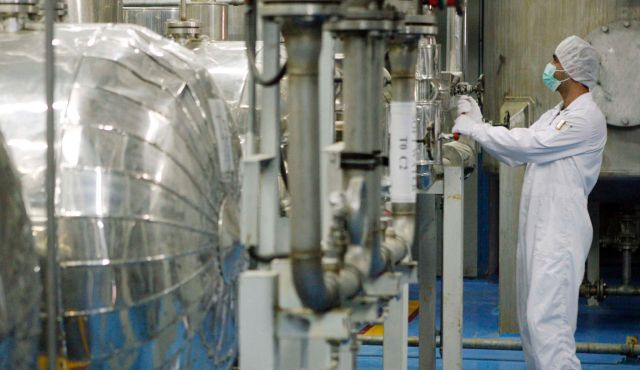Tuesday 9 October 2012 - 19:26
Story Code : 7261
Israeli officials acknowledge that Iran is using enriched uranium for medical purposes
Defense sources say Israel has received additional information that reinforces the IAEA's conclusion that Iran is using enriched uranium for medical purposes.
Iran has diverted much of its enriched uranium to scientific research, an aspect in the International Atomic Energy Agency's lastest report that Israeli policy makers are giving greater emphasis to.
The new emphasis ostensibly justifies a delay in Israel's timetable for possible military action against Iran's nuclear program. Although the data were included in the IAEA's August report, defense sources say additional information has been received that clarifies the report's conclusions.
The report, which the Israeli intelligence community considers highly reliable, states that on a number of occasions in the recent past, Iran has allocated uranium enriched to 20 percent for another purpose: the manufacture of fuel rods for a research reactor in Tehran, where isotopes can be manufactured for cancer treatment.
This information was behind Prime Minister Benjamin Netanyahu's statement during his UN speech last month that Israel was extending its deadline for international action on the Iranian nuclear program until the spring of 2013.
Uranium enriched to 20 percent could help make an atom bomb if it were further enriched to 93 percent. But the moment 20-percent enriched uranium is allocated for scientific purposes, it is difficult to put it back on a bomb-making track.
Senior Israeli defense officials told Haaretz that "Iran has moved the wall back by eight months at least," and Israel's latest position is a consequence of this action.
Until recently, senior Israeli officials had said 2012 was the year of decision on Iran's nuclear program, expressing concerns that Iran would soon be entering a "zone of immunity" in which it would be impervious to an Israeli attack. Their remarks suggested that Israel would have to attack independently before the end of this year, even without coordination with the United States.
Although Netanyahu gave a tough speech at the United Nations, he postponed the Israeli "deadline" to next year. This position stemmed from considerations including the Obama administration's opposition to an attack before the U.S. presidential election on November 6. Also, the Israel Defense Forces' top brass and the Mossad objected to an attack at this time that would not be coordinated with the United States.
Iran has repeatedly said it is enriching uranium for civilian purposes, specifically for medical purposes. Many observers in the international community doubt the veracity of this claim. There is a widespread consensus that Iran actively seeks a military use for its nuclear program.
But it is hard to ignore the significance of Iran's latest move, which seems to be an attempt to reduce international pressure postponing progress on its nuclear program.
According to academic experts in the West, Iran needs around 220 to 250 kilograms of uranium enriched to 20 percent to make one atomic bomb. The rate of its uranium enrichment to this level is now between 12 and 15 kilograms a month.
But although Iran has already produced about 190 kilograms of 20-percent enriched uranium, almost 100 kilograms of that quantity has been diverted to scientific use. Every time Iran enriched more than 130 kilograms to 20 percent, it diverted 15 or 20 kilograms to scientific use.
If Iran still had 190 kilograms, it would now be very close to the "red line" Netanyahu noted in his address - 90 percent of the progress toward the ability to manufacture one nuclear bomb.
In such a case, Israel's leaders would feel they were close to a decision to take action. This is because Iran would be approaching the safety margin the Israeli intelligence community says it needs to ease concerns that Iran would make a surprise breakthrough to the threshold of manufacture of an atomic bomb.
Israel's leaders are also apparently being led by a further consideration. Two major exercises are being held this month in the region - a naval maneuver by the United States and its allies to remove land mines from the Persian Gulf, and an Israeli-American missile defense exercise on Israeli soil.
The first American troops to take part in the exercise, dubbed Austere Challenge 12, have already arrived. By later in October, around 1,000 American soldiers and officers will be in the country to train in identifying and intercepting missile and rocket attacks, mainly from Iran.
Under such circumstances, Israel would find it hard to act independently against an Iranian nuclear threat before the end of the autumn. If Iran were to attack Israel with American forces here, the move would be perceived as an attempt to draw the United States into a conflict with Iran after Washington had openly stated that it does not want this.
But if Israel warned Washington about its intentions, the American forces would probably leave Israel, which would give Iran early warning of those intentions.
The Americans will remain in Israel until a date close to the U.S. presidential elections in November. The two exercises, in addition to the administration's position and the details in the IAEA's report, are therefore having an impact on what seems to be the creation of an Israeli policy to postpone the window for military action at least until spring 2013.
The Iran Project is not responsible for the content of quoted articles.
# Tags











